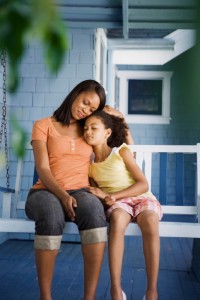 Bullying has long been an issue in the life of children, and parents—many of whom vividly recall memories of peers saying or doing mean things—can often relate to this issue, as well. The good news is that bullying rates appear to be declining. According to the National Institute of Child Health and Human Development, reported incidents of bullying among students in grades six through 10 decreased by 9% from 1998 to 2010.
Bullying has long been an issue in the life of children, and parents—many of whom vividly recall memories of peers saying or doing mean things—can often relate to this issue, as well. The good news is that bullying rates appear to be declining. According to the National Institute of Child Health and Human Development, reported incidents of bullying among students in grades six through 10 decreased by 9% from 1998 to 2010.
There are many reasons for these recent improvements. Many schools have named the issue, and some conduct mandatory workshops to build awareness of bullying. It is common for information about the subject to be posted in school hallways, and some schools even hire counselors to work with children specifically regarding bullying.
The media have also helped increase awareness. Troubling instances of bullying, such as the case of Tyler Clementi, the Rutgers University student who ended his life after being mocked for his sexual orientation, help create dialogue about the issue. Video cameras on smartphones also make it easier to catch a bully in the act. Instances of these videos going viral have helped create an appetite for change.
Anti-Bullying Efforts Still Have a Long Way to Go
Bullying remains a central issue for the young people I work with, which makes sense given the developmental life stage they are in. Erik Erickson, a well-known psychoanalyst who developed theories on the challenges people face at different life stages, spoke about the importance of children developing a sense of industry and competence through their relationships with peers. Our early experience in the schoolyard helps develop our confidence in completing tasks later in life. These relationships are where we develop a sense of confidence in ourselves. Children in school environments where they are constantly put down can end up experiencing low self-esteem or feelings of worthlessness.
There is also an alarming correlation between suicide and bullying. According to Yale University studies, children who are bullied are two to nine times more likely to consider ending their own life.
The Case of “Michael”
It’s rarely talked about, but bullying can be difficult for parents as well as children. No one wants to watch his or her child be in pain, and we are often helpless to prevent it from happening. Our children’s hurt feelings are often experienced as though they are our own.A 9-year-old boy I work with—I’ll call him Michael—was caught between a rock and a hard place. He was deeply troubled after seeing an extremely violent movie at a friend’s sleepover party and did not know what to do with the disturbing emotions he had. Feeling overwhelmed, he confided in his mother. She instantly became enraged at the mother of the boy who had the sleepover, and called her at once to yell at her. The next day at school, Michael’s friends ignored him. When he tried to talk to them, he was shut out and made fun of.
This pattern continued for months. Michael turned again to his mother, who encouraged him to fight one of the boys from the party. This made matters worse, as he was suspended from school and became even more alienated from his peer group.
In my discussions with Michael, it became clear that he mostly had wanted to talk through with his mother the disturbing things he saw in the movie. Rather than trying to get the other kids in trouble, he wanted to process all he had inside and connect with his parents. The way the situation was handled not only left him isolated from his friends, it made him feel disconnected from his mother.
From One Generation to the Next
In discussing the situation with Michael’s mother, she shared with me her own memories of bullying. She, too, was scapegoated by friends and was often told by her father, described as a John Wayne type, to fight back when fighting was not necessary. As we processed the events surrounding Michael, she began to realize how hard it was to hear about her son’s struggles. Telling him to fight back was a way to avoid his troubling feelings.
Talking through all of this helped her to become more connected with Michael, and it helped her to better understand the difficult feelings that most children experience at school. I have seen generational patterns like this with a lot of the families I work with. In Michael’s case, his mother’s processing of her own experiences helped enable him to have someone to turn to when troubling situations came up.
What Parents Can Do to Help
It’s rarely talked about, but bullying can be difficult for parents as well as children. No one wants to watch his or her child experience pain, but we are often helpless to prevent it from happening. Our children’s hurt feelings are often experienced as though they are our own. It is hard enough to let them go when we drop them off at school, but to hear about the horrendous things that sometimes go on with supposed friends is disturbing.
To help with all of this, I recommend a couple of steps for parents:
- Think and talk about your own memories of bullying.
Witnessing our children’s experiences at school naturally stirs feelings related to our own experiences. The more your painful memories are talked about, processed, and understood, the more likely it is your child will have the knowledge and the skills to have a better and different experience. Working with a therapist offers a venue to process these feelings. Parent support groups can also be helpful in this regard. - Help your child talk about and process his or her experience with bullying.
Safety should come first, and if your child is in serious danger, the school or authorities should be alerted immediately. This is not enough, though. Emotional bullying (ignoring, starting rumors), verbal bullying (comments, insults), and cyberbullying (posting mean things online, etc.) are difficult to prevent and sometimes just as damaging. It is important for parents to express curiosity about the impact of all of this. The more a child can use his or her parents to openly process all that goes on with peers, the more resilient they are likely to be when issues come up.
Despite the gains we have made, bullying continues to be a central issue for school-age children. If handled properly, however, it can be an opportunity for parents and children to become more connected, heal wounds of the past, and create new experiences moving forward.
If you need help processing bullying experiences, yours or your child’s, please consider enlisting the help of a qualified therapist.
References:
- Bullying Facts and Bullying Statistics (2014). Bullying suicide statistics. Retrieved from http://nobullying.com/bullying-suicide-statistics/
- Foderaro, L. (2010). Private moment made public, then a fatal jump. The New York Times. Retrieved from http://www.nytimes.com/2010/09/30/nyregion/30suicide.html?_r=0
- Whitener, B. (2014). Bullying decreases amongst middle and high school students. National Institutes of Health. Retrieved from: http://m.nichd.nih.gov/news/releases/Pages/061014-podcast-bullying.aspx
- Berzoff, J. (2008). Chapter 5: Psychosocial ego development: The theory of Erik Erickson. Inside out and outside in (pp. 99-120). Blue Ridge Summit, PA: Rowman and Littlefield.
© Copyright 2015 GoodTherapy.org. All rights reserved. Permission to publish granted by James Wells, MSW, LCSW, Child and Adolescent Issues Topic Expert Contributor
The preceding article was solely written by the author named above. Any views and opinions expressed are not necessarily shared by GoodTherapy.org. Questions or concerns about the preceding article can be directed to the author or posted as a comment below.

 Study Says 23% of Children Are Victimized by Cyberbullying
Study Says 23% of Children Are Victimized by Cyberbullying Is Your Gifted Child Being Bullied? 5 Ways to Help
Is Your Gifted Child Being Bullied? 5 Ways to Help How to Talk to Your Child About Bullying
How to Talk to Your Child About Bullying